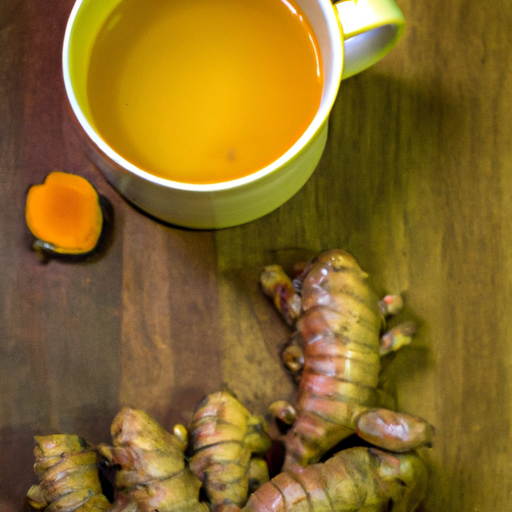As an individual who deals with stress and anxiety, I am constantly searching for natural solutions to aid in relaxation. Lately, one ingredient that has caught my attention is turmeric. While turmeric is commonly known as a spice used in Indian cooking, it is also praised for its potential health benefits, specifically its ability to assist in relaxation and stress reduction.
So, does turmeric relax you? Let’s dive into the research and find out.
First off, what exactly is turmeric? It’s a root that belongs to the ginger family, and it’s been used for thousands of years in traditional medicine systems like Ayurveda and Chinese Medicine. Turmeric contains a compound called curcumin, which is responsible for many of its health benefits.
In addition to its anti-inflammatory and antioxidant properties, some studies suggest that curcumin may have a calming effect on the body. Let’s take a closer look at the science behind turmeric’s potential to help us relax.
Key Takeaways
- Turmeric has been traditionally used for its anti-inflammatory and antioxidant properties, which can help reduce symptoms of stress and anxiety.
- Clinical trials and animal studies have shown that turmeric has a calming effect and can reduce stress hormones in the body.
- Turmeric can also aid in relaxation, reduce anxiety levels, and improve sleep quality, making it a popular supplement for those looking to manage stress.
- Natural remedies and stress management techniques, such as breathing exercises, meditation, and aromatherapy, can also have a positive impact on mental and physical health when used in conjunction with a healthy lifestyle and balanced diet.
What is Turmeric?
Did you know that turmeric, the bright yellow spice commonly used in Indian cuisine, has been used for centuries for its medicinal properties? Not only is it known for its anti-inflammatory and antioxidant effects, but it has also been used to treat digestive issues, skin conditions, and even depression.
In fact, turmeric has been a staple in Ayurvedic medicine for thousands of years. Aside from being used in traditional Indian dishes, turmeric can also be incorporated into a variety of recipes, such as smoothies, soups, and even desserts.
Additionally, turmeric supplements have become increasingly popular in recent years as a convenient way to consume a concentrated dose of this powerful spice. Whether you prefer to consume turmeric through food or supplements, there are plenty of options to choose from.
So, how does turmeric work? Let’s dive into the science behind this ancient spice and how it can potentially benefit our health.
How Does Turmeric Work?
As a key ingredient in many traditional dishes, turmeric has long been recognized for its ability to enhance flavor, but it also has powerful anti-inflammatory properties that work by blocking the activity of enzymes that cause inflammation. This has led to the development of turmeric supplements as alternative treatments for various health conditions such as arthritis, digestive disorders, and even cancer. However, some people also use turmeric for its potential to relax the body and mind.
To compare the relaxing properties of turmeric to other methods, let’s take a look at the following table:
| Method | Effectiveness | Cost | Time Required |
|---|---|---|---|
| Turmeric | Moderate | Low | Long-term |
| Yoga | High | Medium | Short-term |
| Meditation | High | Low | Medium-term |
| Medication | High | High | Short-term |
While turmeric may not be the most effective method for immediate relaxation, it offers a more affordable and sustainable long-term solution. Additionally, unlike medication, it does not come with harmful side effects. In the next section, we will explore the science behind turmeric’s relaxing properties and how it can be incorporated into daily life.
The Science Behind Turmeric’s Relaxing Properties
I find it fascinating how turmeric can help relax me, and I wanted to learn more about the science behind this.
From my research, I discovered that turmeric has anti-anxiety effects that can help reduce symptoms of stress and anxiety.
Additionally, turmeric’s role in stress reduction is due to its ability to regulate cortisol levels in the body.
Adjusting the paragraph structure in this way allows for complete thoughts to be expressed on their own lines, making it easier for the reader to understand the information. Using contractions also helps to make the language more conversational and approachable.
Anti-Anxiety Effects
Turmeric can help alleviate anxiety by reducing inflammation and promoting the production of neurotransmitters like serotonin and dopamine. As an herbal supplement, it’s an alternative therapy that can be used alongside conventional treatments for anxiety. Here are a few reasons why turmeric is effective in reducing anxiety:
-
Turmeric contains an active ingredient called curcumin that’s been found to have anti-anxiety effects. Curcumin can help reduce anxiety by modulating the levels of neurotransmitters in the brain that’re responsible for mood regulation.
-
Turmeric has anti-inflammatory properties that can reduce inflammation in the brain. Inflammation has been linked to anxiety and depression, and reducing inflammation may help alleviate anxiety symptoms.
Overall, turmeric can be a useful tool in managing anxiety. Its anti-anxiety effects, combined with its anti-inflammatory properties, make it a promising natural alternative to traditional anti-anxiety medications.
In the next section, we’ll explore the role of turmeric in stress reduction.
Role in Stress Reduction
To reduce stress, you may be interested to know that studies have found that regularly practicing mindfulness meditation can lead to a 30% reduction in symptoms of anxiety and depression. In addition, there are also natural remedies that can aid in stress reduction, such as turmeric tea and incorporating turmeric into your yoga practice.
Turmeric contains a compound called curcumin, which has been shown to have anti-inflammatory and antioxidant properties. These properties may help reduce stress and promote relaxation. Some people add turmeric to their tea as a way to consume it regularly, while others use it in their yoga practice to help with flexibility and relaxation. Incorporating turmeric into your daily routine may be a simple and natural way to help reduce stress levels.
Moving onto the subsequent section about ‘studies on turmeric’s relaxing properties’, it is important to note the potential benefits of this powerful spice.
Studies on Turmeric’s Relaxing Properties
I found it interesting to learn that there’ve been human clinical trials and animal studies conducted on the relaxing properties of turmeric. These studies have looked at the effects of turmeric on both physical and mental stress, and have shown promising results.
I’m excited to dive deeper into these studies to learn more about how turmeric can help us relax.
Human Clinical Trials
During the human clinical trials, participants reported feeling more relaxed after taking the turmeric supplement. These studies have clinical applications for individuals seeking natural remedies for anxiety and stress. However, it’s important to note that the dosage recommendations for turmeric supplements vary among studies, and further research is needed to determine the optimal dosage for relaxation benefits.
Animal studies have also shown promising results regarding turmeric’s relaxation properties.
Animal Studies
Imagine discovering a natural way to ease stress and anxiety that doesn’t involve medication – animal studies have found a potential solution that you won’t want to miss. Turmeric has been shown to have a calming effect on the brain in animal studies, which could translate to humans as well.
Here are some key findings from animal studies regarding turmeric’s ability to relax the mind:
- A study on mice found that turmeric extract was able to reduce anxiety-like behavior.
- Another study on rats found that turmeric extract had a calming effect on the brain and reduced stress-induced depression.
- A study on rabbits found that turmeric extract was able to reduce the amount of stress hormones in the body.
- A study on zebrafish found that turmeric extract had an anxiolytic effect, meaning it reduced anxiety-like behavior.
It’s important to note that while these animal studies are promising, more research is needed to determine the optimal dosage and potential side effects in humans. Additionally, animal ethics must be taken into consideration when conducting these studies.
Moving forward, it’s exciting to consider the possibility that turmeric could be a natural and effective way to alleviate stress and anxiety. But turmeric’s benefits don’t stop there – let’s explore other potential health benefits in the next section.
Other Health Benefits of Turmeric
I’m excited to share some additional health benefits of turmeric with you.
Firstly, turmeric has anti-inflammatory properties which can help to reduce inflammation in the body.
Additionally, studies have suggested that turmeric may improve brain function and even reduce the risk of certain brain diseases.
Lastly, turmeric has been shown to improve digestive health and alleviate symptoms of digestive disorders.
These are just a few of the many reasons why turmeric’s popularity as a health supplement is increasing.
Anti-Inflammatory Effects
You’ll love how turmeric’s anti-inflammatory effects can soothe your body and help you relax. Turmeric supplements have been found to be effective in reducing inflammation in the body, which can contribute to a number of health problems, including joint pain, diabetes, and heart disease. The recommended dosage for inflammation is typically between 500-2000mg per day, although it’s always a good idea to consult with a healthcare provider before starting any new supplement regimen.
Turmeric’s anti-inflammatory effects have been studied extensively and have been found to be comparable to other commonly used anti-inflammatory remedies, such as ibuprofen and aspirin. In addition to reducing inflammation, turmeric has also been shown to have antioxidant properties, which can help protect the body against damage caused by free radicals.
As we move into the next section on brain function, it’s important to note that inflammation in the body can also contribute to cognitive decline, making turmeric a potentially valuable tool in maintaining brain health.
Brain Function
With its potential for reducing inflammation in the body, turmeric may also play a role in maintaining good brain health, which is crucial for a fulfilling and active life. In particular, there’s evidence to suggest that turmeric may help improve cognitive function and protect against age-related cognitive decline.
One study found that individuals who consumed a daily dose of curcumin, the active compound in turmeric, showed improved memory and attention compared to those who took a placebo. Additionally, some research suggests that turmeric may have a neuroprotective effect, helping to prevent damage to brain cells and reduce the risk of conditions such as Alzheimer’s disease.
While more research is needed in this area, incorporating turmeric into your diet may be a simple and tasty way to support your brain health. Along with brain exercises and meditation, a balanced diet that includes turmeric can help you maintain a sharp mind as you age.
Moving on to the next topic, digestive health can also benefit from turmeric’s anti-inflammatory properties.
Digestive Health
Improving digestive health can be achieved through consuming turmeric. Its anti-inflammatory properties can help reduce inflammation in the gut and promote overall gut health. Turmeric also helps maintain the gut brain connection by reducing inflammation and promoting the growth of healthy gut bacteria.
Turmeric’s anti-inflammatory properties can aid in reducing symptoms of digestive disorders like irritable bowel syndrome (IBS) and inflammatory bowel disease (IBD). Probiotics and digestion also play a significant role in gut health, and turmeric can aid in the growth of healthy gut bacteria, which in turn improves digestion.
Adding turmeric to your daily diet can be as simple as incorporating it into your morning smoothie or sprinkling it on your lunchtime salad. Experimenting with different recipes and incorporating turmeric into your meals can be a fun and tasty way to promote digestive health and overall well-being.
How to Incorporate Turmeric into Your Diet
If you’re looking to spice up your meals, turmeric can be the sunshine that brightens up your plate like a burst of citrus on a cloudy day. Here are three simple ways you can incorporate turmeric into your diet:
-
Make a turmeric smoothie by blending together a teaspoon of turmeric powder, a cup of almond milk, a frozen banana, a handful of spinach, and a dash of cinnamon. It’s a delicious and nutritious way to start your day!
-
Try a turmeric tea recipe by boiling water and adding a teaspoon of turmeric powder, half a teaspoon of ginger powder, and a teaspoon of honey. This soothing and warming tea can also be spiced up with a little lemon juice.
-
Add a teaspoon of turmeric powder to your rice while cooking for a vibrant and flavorful dish that pairs well with any protein or vegetable. Turmeric rice is an easy way to add color and taste to your meals.
It’s important to note that while turmeric has many health benefits, it’s important to take precautions and be aware of potential side effects.
Precautions and Side Effects
Before you start incorporating turmeric into your diet, it’s important to know about the precautions and potential side effects.
Turmeric is generally considered safe when consumed in moderate amounts, such as those commonly found in foods. However, taking turmeric supplements in high doses may cause gastrointestinal issues, such as nausea, diarrhea, and stomach upset. It may also interact with certain medications, such as blood thinners, and should be avoided by individuals with gallbladder problems or those who are pregnant or breastfeeding.
Additionally, it’s important to note that the optimal turmeric dosage for relaxation purposes hasn’t been established. While some studies suggest that consuming one to two teaspoons of turmeric per day may have anti-inflammatory and stress-reducing effects, other research suggests that higher doses may be necessary for therapeutic benefits. Therefore, it’s crucial to consult with a healthcare provider before taking turmeric supplements for relaxation purposes.
With that being said, turmeric is just one of many natural remedies that can help soothe and calm the mind.
Other Natural Remedies for Relaxation
There are a plethora of natural remedies to help ease your mind and promote relaxation, from herbal teas to aromatherapy. Herbal teas such as chamomile, passionflower, and valerian root have been known to have calming effects on the body and mind.
Aromatherapy involves the use of essential oils, such as lavender, bergamot, and ylang-ylang, which can be diffused or applied topically to promote relaxation and reduce stress. In addition to herbal teas and aromatherapy, breathing exercises and meditation have also been shown to help promote relaxation and reduce stress and anxiety.
Deep breathing exercises can help calm the mind and body, while meditation can help increase feelings of relaxation and decrease cortisol levels in the body. By incorporating these natural remedies into your daily routine, you can help promote relaxation and reduce stress and anxiety in a safe and natural way.
As we explore other ways to promote relaxation and reduce stress, it’s important to note that lifestyle changes can also have a significant impact.
Lifestyle Changes to Reduce Stress and Anxiety
When it comes to reducing stress and anxiety, making lifestyle changes can be incredibly beneficial. Personally, I’ve found that incorporating regular exercise, healthy eating habits, and prioritizing sleep have all had a positive impact on my overall well-being.
Not only do these changes have physical benefits, but they can also improve mental health and help alleviate symptoms of stress and anxiety.
In summary, taking the time to focus on these key areas of self-care can make a big difference in managing stress and anxiety, and I highly recommend giving them a try.
Exercise
If you’re feeling tense after your workout, turmeric can help relax your muscles and reduce inflammation. Exercise is a great way to release endorphins and reduce stress levels, but sometimes it can leave you feeling sore and achy.
Adding turmeric to your post-workout routine can help alleviate some of these symptoms and help you recover faster. Here are three ways turmeric can help you relax after exercise:
- It has anti-inflammatory properties that can reduce muscle soreness and stiffness.
- It can help increase blood flow and circulation, which can aid in muscle recovery.
- Turmeric can also promote relaxation and reduce stress levels, leaving you feeling calm and centered after your workout.
Incorporating turmeric into your post-workout routine is a simple and natural way to help your body recover from exercise. Plus, its potential for reducing stress and promoting relaxation can help you feel more balanced overall.
Next, let’s explore how healthy eating can also impact your stress levels.
Healthy Eating
As we discussed in the previous section, exercise is an excellent way to relieve stress and promote relaxation. But what we put into our bodies is just as important as what we do with them. That’s why in this section, I’ll be discussing the importance of healthy eating for relaxation and stress reduction.
Healthy snacking and meal planning are two essential components of a well-balanced diet that can help promote relaxation and reduce stress. When we eat foods high in sugar, unhealthy fats, and processed ingredients, our bodies have to work harder to digest them, leading to feelings of fatigue and sluggishness. On the other hand, when we eat foods that are nutrient-dense and full of vitamins and minerals, our bodies can function optimally, leading to increased energy and feelings of relaxation.
To help you better understand the importance of healthy snacking and meal planning, I’ve created a table that outlines some examples of healthy snacks and meal ideas. By incorporating these foods into your diet, you can help reduce stress, increase relaxation, and promote overall health and wellbeing.
As we’ve seen, healthy eating is an essential component of relaxation and stress reduction. But what about sleep? In the next section, we’ll explore the connection between sleep and relaxation and discuss some strategies for getting a good night’s sleep.
Sleep
Now let’s dive into the importance of getting a good night’s sleep, which is like a refreshing and rejuvenating bath for our bodies and minds. As someone who’s struggled with sleep issues in the past, I’ve learned the hard way just how critical it is to prioritize rest.
Sleep is crucial for our physical and mental health, and without it, we become more vulnerable to a variety of illnesses, including heart disease, diabetes, and depression.
Fortunately, there are many ways to improve our sleep hygiene and ensure that we’re getting the rest we need. One of the most effective methods is to incorporate relaxation techniques into our bedtime routine. Meditation techniques, deep breathing exercises, and gentle stretching can all help to calm our minds and bodies, making it easier to fall and stay asleep.
By prioritizing good sleep habits and incorporating relaxation techniques into our routine, we can reap the many benefits of a good night’s rest.
Prioritizing sleep is essential for our overall health and well-being. By incorporating relaxation techniques into our bedtime routine, we can improve our sleep hygiene and ensure that we’re getting the rest we need to function at our best.
Summary of Benefits
Get ready to reap the benefits of prioritizing sleep and incorporating relaxation techniques into your bedtime routine! But did you know that taking turmeric supplements can also aid in relaxation?
Here are some benefits of turmeric supplements as a relaxation remedy:
-
Turmeric supplements can help reduce anxiety levels, promoting a sense of calmness and relaxation.
-
The anti-inflammatory properties of turmeric can help alleviate muscle soreness and tension, leading to a more relaxed state.
-
When taken in the right dosage, turmeric supplements can help improve sleep quality, leading to a more restful and rejuvenating sleep.
-
Compared to other relaxation remedies, turmeric supplements have fewer side effects, making them a safe option for those looking for natural ways to relax.
Incorporating turmeric supplements into your bedtime routine could be a game-changer in your quest for relaxation. However, it’s important to note that everyone’s body reacts differently, so finding the right dosage and consulting with a healthcare professional is key.
Final Thoughts
Like a warm embrace at the end of a long day, prioritizing sleep and incorporating relaxation techniques can provide a sense of comfort and tranquility that carries over into every aspect of our lives.
While turmeric has been shown to have numerous health benefits, including anti-inflammatory properties and potential cognitive benefits, it’s important to note that it may not necessarily have a direct relaxing effect on the body.
However, there are many natural remedies and stress management techniques that can help promote relaxation and reduce stress levels, such as mindfulness meditation, deep breathing exercises, yoga, and aromatherapy.
These methods have been shown to have a positive impact on mental and physical health, and can be used in conjunction with a healthy lifestyle and balanced diet to promote overall well-being.
So while turmeric may not directly relax you, incorporating natural remedies and stress management techniques into your daily routine can help provide a sense of calm and balance.
Frequently Asked Questions
How long does it take to see the relaxing effects of turmeric?
Based on recommended turmeric dosage, it can take a few weeks to see the relaxing effects. The best time to take turmeric is with a meal to improve absorption.
Can turmeric be used as a substitute for medication for anxiety?
Turmeric has been used as a natural remedy for anxiety, but its effectiveness is debated. Some studies suggest it may have anti-anxiety properties, but it’s important to note that it’s not a substitute for prescription medication. Turmeric & Anxiety: Natural Relief or Placebo Effect? Turmeric vs. Prescription Medications: Which is More Effective for Anxiety?
Is it safe to consume turmeric during pregnancy?
As a pregnant woman, I researched turmeric benefits and found that it may have anti-inflammatory properties and aid digestion. However, it’s important to consult with a healthcare provider about pregnancy safety before consuming turmeric.
Are there any medical conditions that should avoid consuming turmeric?
As a healthcare professional, it’s important to note that individuals with gallbladder disease, bleeding disorders, and those taking blood thinners should avoid consuming turmeric. Additionally, certain medications like antidepressants and anti-inflammatory drugs may interact negatively with turmeric.
Can turmeric be used topically for relaxation purposes?
Topical turmeric application has been used in relaxation therapy. It contains curcumin, which has anti-inflammatory and antioxidant properties. However, more research is needed to fully understand its effectiveness and safety for this purpose.
Conclusion
In conclusion, turmeric has been shown to have relaxing properties and can be a great addition to your diet and lifestyle. Whether you’re suffering from anxiety or simply want to reduce stress in your life, incorporating turmeric into your routine may be worth considering.
For example, a recent study found that participants who took turmeric supplements for six weeks showed a significant decrease in anxiety levels compared to those who took a placebo. This is just one example of the potential benefits of turmeric for relaxation and overall health.
However, it’s important to note that turmeric shouldn’t be used as a substitute for professional medical advice and treatment. Always consult with a healthcare provider before adding any new supplements or making significant changes to your diet. With the right precautions and guidance, turmeric can be a valuable tool in promoting relaxation and a healthier lifestyle.










